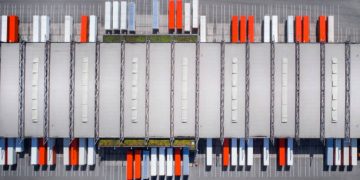Supply Chain Report – 10/07/2025
US President Donald Trump announced that beginning November 1, all medium- and heavy-duty trucks imported into the United States will be subject to a 25% tariff. The policy, which was initially scheduled to take effect on October 1, was delayed after discussions with auto industry leaders who voiced concerns about rising costs, supply chain challenges, and market competitiveness.
The new tariff is part of a broader effort by the Trump administration to strengthen domestic industries, encourage local production, and reduce the country’s reliance on foreign imports. The White House described the move as a necessary step to ensure that American truck manufacturers remain competitive in a market increasingly influenced by global production and cost structures.
In a statement, President Trump emphasized that the decision is aimed at protecting American workers and restoring balance in trade practices. “These tariffs are necessary to restore fairness and protect our workers,” Trump said. “We cannot continue allowing our industries to be undermined by foreign dumping and unfair practices.”
The decision follows months of consultations between government officials, trade representatives, and automakers. Industry groups have been divided in their reactions—while some American manufacturers welcomed the move as a way to stimulate local growth, others warned that it could lead to higher operational costs and reduced supply flexibility.
Global Impact and Trade Repercussions
India, which does not export trucks to the United States, will remain unaffected by this new trade measure. However, several major exporting nations—including Mexico, Canada, Japan, Germany, and Finland—are expected to be directly impacted. These countries collectively represent the bulk of heavy-duty truck imports into the US market, and analysts predict the new tariff could reshape trade flows, manufacturing strategies, and pricing structures in the global automotive industry.
Mexico, in particular, could experience significant disruption. The country has become a key production base for commercial vehicles sold in the United States. Since 2019, Mexico’s exports of medium- and heavy-duty trucks to the US have tripled, reaching approximately 340,000 units annually. Under the current United States-Mexico-Canada Agreement (USMCA), these trucks move tariff-free as long as 64% of their value originates from North American materials, components, or labor.
The new 25% tariff, however, may alter this framework. Trade experts note that such a measure could challenge the existing provisions of the USMCA and potentially prompt re-evaluation of regional supply chain operations. Automakers that rely heavily on cross-border production may need to adjust sourcing strategies, shift manufacturing operations, or negotiate new supplier agreements to remain compliant and cost-efficient.
Industry Response and Adjustments
Several automakers are closely monitoring the situation. Stellantis, the parent company of brands such as Ram and Jeep, produces a large number of Ram trucks and commercial vans in Mexico. The company has reportedly been in talks with US officials to mitigate the potential impact of higher tariffs on vehicles manufactured outside the country.
Meanwhile, other global manufacturers such as Daimler Truck, Volvo Group, and Paccar—owner of brands like Peterbilt and Kenworth—are also expected to feel the effects. While Paccar could benefit from reduced foreign competition, international companies that supply heavy-duty trucks to the US may face increased financial pressure.
Despite the upcoming tariff, Sweden’s Volvo Group remains committed to its $700 million investment in a new heavy-truck manufacturing plant in Monterrey, Mexico. The facility, expected to begin operations in 2026, will serve as a key hub for both North American and global markets. Industry observers suggest that this move highlights manufacturers’ long-term confidence in Mexico’s role as a strategic production base, despite short-term trade uncertainties.
Economic and Consumer Implications
Economists and market analysts have expressed mixed views on the long-term effects of the new tariff. Supporters argue that the policy could revitalize domestic truck manufacturing, encourage companies to invest more heavily in US-based operations, and create new employment opportunities in related industries such as steel, aluminum, and automotive components.
Critics, however, warn that tariffs of this magnitude could increase the cost of imported parts and finished vehicles, driving up prices for American consumers and businesses. Logistics firms, freight operators, and construction companies that rely on heavy-duty trucks for daily operations may experience higher equipment costs, which could, in turn, translate to increased transportation and delivery expenses across multiple sectors of the economy.
The higher tariffs also pose questions about the future of trade relations between the United States and its partners. Some analysts caution that the measure could prompt retaliatory actions or lead to renegotiations within existing trade frameworks, especially if the tariff significantly affects exports from major allies like Japan and Germany.
Trade Policy in Transition
Currently, the US imposes a 15% tariff on light-duty vehicles imported from Japan and the European Union. However, it is unclear whether similar exemptions or modifications will apply to larger vehicles under the new policy. The 25% rate represents a substantial increase and signals the administration’s intention to assert greater control over key industrial sectors.
The Trump administration has previously implemented measures allowing manufacturers to deduct the value of US-made components from tariffs on light-duty vehicles assembled in Canada and Mexico. Whether similar allowances will be extended to heavy-duty trucks remains to be seen.
As November 1 approaches, the global automotive industry faces an environment of heightened uncertainty. Manufacturers are preparing contingency plans, trade experts are assessing compliance scenarios, and governments are watching closely for potential economic ripple effects.
The 25% tariff on imported medium- and heavy-duty trucks underscores the administration’s ongoing push toward trade protectionism and domestic industrial revitalization. While the long-term outcome will depend on how global manufacturers, suppliers, and trading partners adapt, the decision is already reshaping discussions on supply chain resilience, regional production strategy, and the evolving nature of global trade.
#TradePolicy #USImports #AutomotiveIndustry #SupplyChainNews #NewsUpdate















